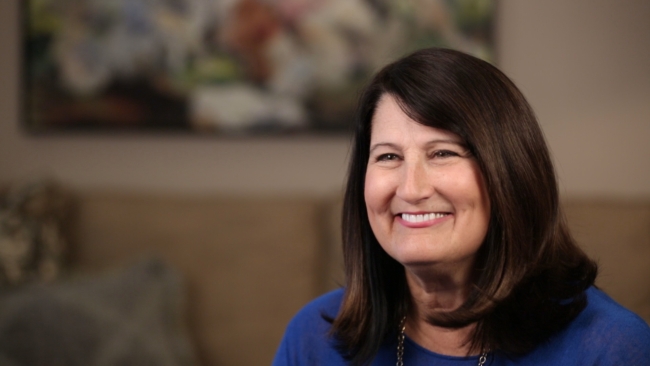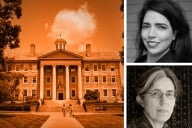You have /5 articles left.
Sign up for a free account or log in.

Martha Burger will become president of Oklahoma City University on July 1.
Oklahoma City University
When Oklahoma City University named Martha Burger its next president recently, the announcement caught some outside observers by surprise and raised a few eyebrows in higher education circles.
Burger, a longtime trustee of the university and former energy industry executive, had no prior academic experience. She was initially a member of the search committee that helped the university find and vet candidates for the presidency of the 114-year-old private institution.
Late in the search process, however, and just before the university's board started interviewing nine candidates culled from a pool of nearly 35, Burger resigned from the search committee and placed herself in contention for the job.
"It was not an easy decision," Ronald Norick, the board's chairman, said of the selection of Burger. "We had a really good group of candidates, very good and well-qualified candidates."
But "after a lot of deliberations with the whole search committee, which included faculty and trustees," the board ultimately decided their former colleague was the best choice for the job. They announced the selection of Burger March 25.
The next day, the University of Oklahoma announced James Gallogly, also a former energy executive with no prior academic experience, as its replacement for the outgoing president.
Gallogly had served on the board of Oklahoma's school of engineering, which was named for his family after he and his wife, in partnership with another family, donated $30 million to the university three years ago. Burger donated funds to Oklahoma City University.
In a state with a history of universities choosing nonacademics as university presidents -- Burns Hargis, a lawyer and former banker, has been president of Oklahoma State University for a decade, and the outgoing president of the University of Oklahoma is David Boren, the former governor and U.S. senator -- the selections generated largely positive reactions.
Similar decisions are being made at other universities as funding cuts and demographic changes prompt institutions to rethink how they hire their leaders, and to take a "more thoughtful and nuanced approach than in the past," said Terry Hartle, senior vice president of the American Council on Education.
"What you're seeing now is a number of institutions and more presidential search committees focusing on institutional specific needs at that moment in the school's history," he said.
This was clearly the case at OCU, which enrolls approximately 2,600 students, 1,600 of them undergraduates. Norick, the board chairman, noted that Burger, who had been a trustee since 2002, chaired the board's finance and audit committee and was a member of its executive committee for several years.
"She obviously had a lot of background experience with the school," he said. "That and her local ties to the business committee -- she knew a lot of people and had done a lot in the city -- was important to the search committee in terms of fund-raising and getting donations."
An outside candidate would need time to get acquainted with local community groups, business and civic leaders, and deep-pocketed philanthropists, he said.
"It would take longer to get to know them and ask for donations," he said. "That was critical to the search committee, as well as the executive committee. Private universities need money; we don't have large endowments like some schools."
Some executive search firm managers believe such hires are becoming more common.
"More and more we're finding that university search committees, especially for president positions, are looking for nontraditional people," said Rod McDavis, a former president of Ohio University and managing principal of AGB Search, an executive search firm that specializes in higher education hires. "I think that's going to be a continuing trend in higher education."
McDavis said that's partly because many university board members come from the private sector and view people in private sector jobs as having the qualifications and skills to serve as president of a university.
Hartle said the data on university presidents shows that this hiring trend may not be widespread.
While search committees may be more open to hiring presidents with nontraditional backgrounds, “the data would not suggest that substantially larger numbers are being hired,” he said.
"The fact is there have always been some people from nonacademic backgrounds who became university presidents, between 10 and 20 percent," he said, adding that the numbers have remained relatively constant for a generation.
Search Firms on the Rise
What has increased is the use of executive search firms by universities seeking presidents and other senior administrators.
“We have done research that indicates that 50 years ago, less than 2 percent of searches for a public university president involved search firms,” said Judith Wilde, chief operating officer and professor at the Schar School of Policy and Government at George Mason University. “Now, as of 2016, it was 92 percent, most of them in the last 20 years.”
What’s more, the universities are spending millions on these firms, said James Finkelstein, professor emeritus of public policy at George Mason and an expert on the selection and employment of university presidents.
Finkelstein did the first major study of contracts between universities and executive search firms. Among his findings: 14 public universities in Ohio spent an estimated $25 million on search firms from 2004 to 2014 to help fill various jobs from midlevel administrative to senior executive positions.
That’s not the only thing that has changed about the selection of college presidents, Hartle said.
"Historically the qualification for a college president was simply the ability to walk on water," he said. "They wanted someone who was a brilliant academic, a prolific fund-raiser and a gifted administrator. Now there's more recognition of the diverse needs of institutions, and to target the search on those needs."
For her part, Burger said questions about her qualifications for the job came up frequently when she had back-to-back meetings on campus with various student and faculty groups, deans, the current president, and members of his cabinet, during a daylong series of interviews that was part of the selection process.
“‘You're not from the academic world, how is that going to work?’ I was asked this question a lot,” she said.
She told them about “how I led others and built a culture of trust by working through others, empowering people, engaging people and removing barriers for people who are experts in their fields.”
Jason Foreman, chairman of the executive committee of the Faculty Senate, which represents some 225 faculty members, said Burger was a strong candidate from the start. He was on the search committee that chose her as one of three finalists for the job and says he’s excited about her getting the position.
“I think one of the things that is interesting about Martha is that was she was astute about the university and had high buy-in before she threw her hat in the ring,” he said. “I worked with her on two committees; she spent a lot of time and energy to get a deeper understanding and learn about what makes the university tick through the work of the faculty and staff and the issues they are facing.”
Said Burger, “For me it boils down to leadership.” She pointed to her business background, which includes being co-founder of Amethyst Investments LLC and stints as senior vice president of human and corporate resources at Chesapeake Energy Corporation (she was among four top Chesapeake executives pushed out as part of a reorganization in 2013) and as a member of the board of Tapstone Energy.
A university representative said OCU does not make donation details public and would not say how much money Burger has given the school. But, as is common for universities that name buildings, academic programs or endowed chairs for large donors, the Martha Burger Career Services Center, housed in the school of business, is named for her.
"I have been a consistent donor for about 10 years," Burger said. "I don't know what the total amount is."
Burger is also president of Oklahoma’s Board of Health, a voluntary position she was appointed to by the governor and one she will resign before she becomes OCU’s president July 1. “Successful presidents have come from the business community,” she said.
Others agree, citing examples such as Bruce Benson, president of the University of Colorado system since 2008, a former oilman with a bachelor’s degree in geology who is widely considered a gifted leader.
“Nontraditional candidates can be very good or very bad college presidents, and academics can be very good or they can crash and burn -- there are no guarantees,” said Hartle.
Burger often mentioned her business experience during her meetings on campus, as well as her long relationship with the university; she got her M.B.A. there in 1992 and received an honorary doctorate of humane letters in 2012.
“I bring a deep knowledge of this particular institution,” she said, citing her involvement in OCU’s budget process when the university restructured its debt as an example.
“I really know and love OCU and bring a business perspective and way of thinking about things,” she said in a later interview. “I think I also bring a connection to our community. I think this resonated with the constituents I talked to. I found people to be very open-minded and curious about what I would bring to the university.”
Blake Lemmons, a junior majoring in political science, told MediaOCU, an independent online student news site, that he was optimistic about Burger becoming president.
She’s “going to be great for the university because she’d be good at fund-raising and everything,” he said. “She already has a really good working relationship with the trustees because she was a trustee, and she knows how to be an administrator because that was her role at Chesapeake.
“I think that she’ll have a bit of a learning curve, but I think all of the candidates were going to have a learning curve in some aspect or another.”








